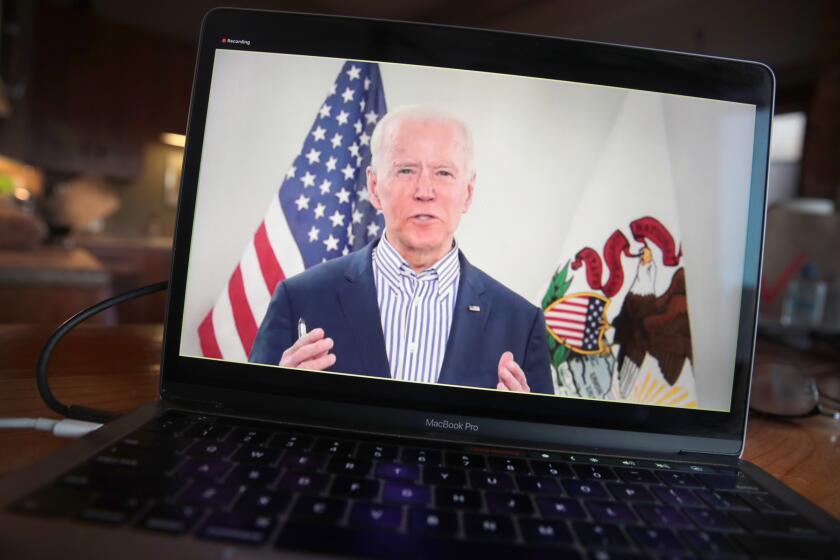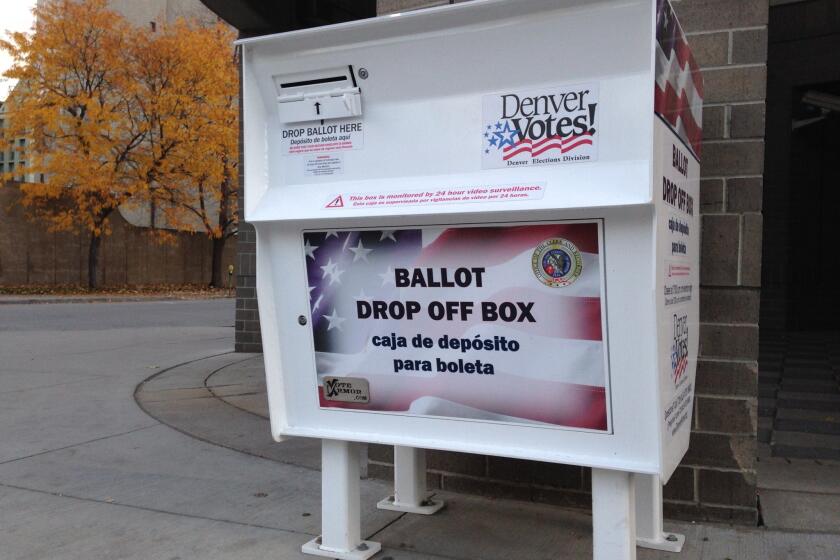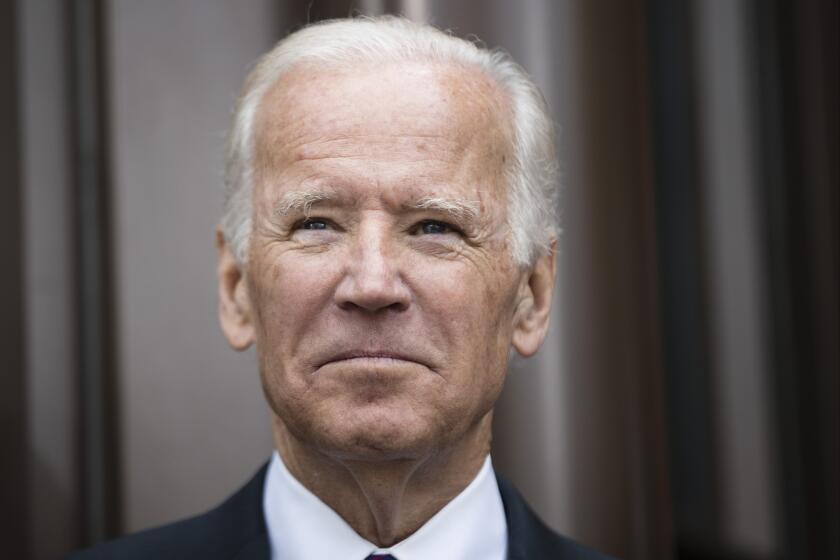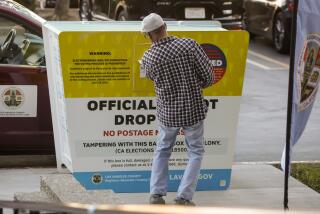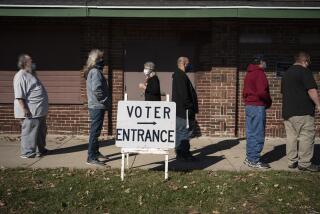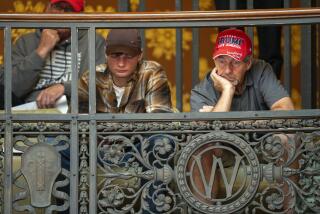Coronavirus turned the 2020 presidential race upside down, but not in Wisconsin
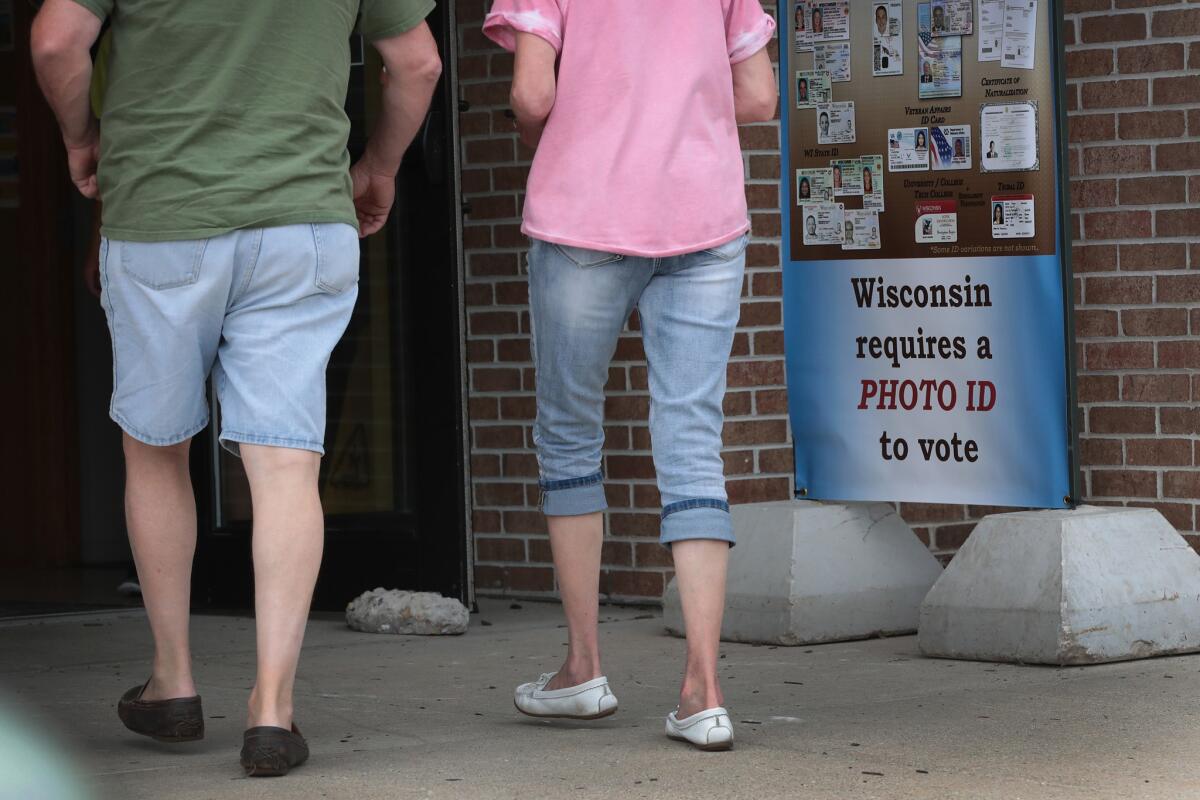
How do you run an election in the middle of a global pandemic? Some states have postponed voting or shifted to mail-only balloting. Some states have taken both approaches.
Wisconsin, the next state to head to the polls, has done neither.
Tuesday’s primary will go on as planned, despite efforts to delay it. State officials have urged voters to request absentee ballots by Thursday, leading to application numbers that have far surpassed both the 2016 presidential primary and general election.
The state reported Wednesday that a record-setting 1,053,556 voters had requested absentee ballots. So far 387,833 mail ballots have been returned. (In the state’s April 2016 election, 249,503 voted by absentee ballots.)
There have been calls, including from Democratic presidential hopeful Bernie Sanders, for Wisconsin to push back its election, as 15 other states have. “People should not be forced to put their lives on the line to vote,” Vermont Sen. Sanders said Wednesday. “The state should delay Tuesday’s vote, extend early voting and work to move entirely to vote-by-mail. While we wait for a decision, we urge our supporters to vote-by-mail.”
In a Marquette University poll released Wednesday, Sanders’ rival, former Vice President Joe Biden, was backed by 62% of registered voters in Wisconsin, while 34% supported the senator.
Door knocking is out, rallies, too. The coronavirus pandemic has operatives scrambling. ‘This is the fastest we have ever had to change,’ one says.
Even with the astronomical increase in absentee voting, officials are concerned that people will show up at polling places, which could be understaffed and crowded, making social distancing impossible.
Wisconsin is short nearly 7,000 poll workers, according to a memo from the Wisconsin Elections Commission released Tuesday. To address the shortage, Gov. Tony Evers agreed to use members of the Wisconsin Army National Guard to help staff locations.
Last month, the head of the Wisconsin Elections Commission wrote to the governor requesting more hand sanitizer and surface cleaning supplies, assistance to recruit poll workers and access to public health officials to help create election guidelines.
It may not be safe to go to the polls in November. There is still time for states to switch to a mail-in ballot nationwide, but not much, and some states continue to resist.
“Voters should not have to choose between voting or staying healthy,” wrote Meagan Wolfe, the state’s chief election official. “Poll workers should not have to choose between serving their community or staying healthy. Our local election officials should not have to choose between facilitating democracy or staying healthy.”
There have been more than 1,550 confirmed cases of COVID-19 and at least 27 deaths in Wisconsin.
As the coronavirus outbreak has spread, state leaders and election officials outside of Wisconsin grew more inclined to postpone voting by weeks or months, dramatically transforming the presidential primary calendar. West Virginia Gov. Jim Justice announced Wednesday that his state’s May 12 primary will now be held on June 9. New York Gov. Andrew Cuomo announced Saturday that his state would push its April 28 election to June 23. Thirteen other states had already rescheduled their primary contests.
April, which should have been a big month for presidential primary contests, has now been whittled down to five races. The biggest prizes are Wisconsin, with 85 pledged delegates, and Ohio, with 136.
Just over half of the Democratic Party’s 3,979 delegates have been allocated. No candidate has yet secured the 1,991 delegates needed to clinch the nomination. Biden leads by more than 300 delegates, thanks to a stunning comeback in February, which makes it mathematically difficult, but not impossible, for Sanders to prevail.
The COVID-19 pandemic has the country’s politics in turmoil. Answers to those questions and more.
June 2, when nearly 700 delegates are up for grabs in 10 states and the District of Columbia, has now emerged as the next Super Tuesday.
Further complicating matters is a Democratic National Committee rule that all states must hold their primaries by June 9 and pick delegates by June 20. States that fail to meet the deadline could lose at least half their delegates. The DNC hasn’t decided how to address states — New York, Louisiana and Kentucky — that have scheduled primaries after June 9.
“We will continue to monitor the situation and work with state parties around their delegate selection plans, and if states move beyond the June 9th window stated in our rules, the Rules and Bylaws Committee will meet to discuss and determine next steps,” Xochitl Hinojosa, a DNC spokeswoman, wrote in an email.
Twenty-seven states, territories and the District of Columbia have not yet voted. Here is what the Democratic primary calendar looks like for the rest of the season:
April
April 7 — Wisconsin. 84 delegates. Polls will be open, voters may request an absentee ballot.
April 10 — Alaska. 15 delegates. Mail ballots only.
April 17 — Wyoming. 14 delegates. Mail ballots only.
April 26 — Puerto Rico. 51 delegates. Polls will be open.
April 28 — Ohio. 136 delegates. Mail ballots only.
May
May 2 — Guam. 7 delegates. Caucuses.
May 2 — Kansas. 39 delegates. Mail ballots only.
May 12 — Nebraska. 29 delegates. Polls will be open, voters may request an absentee ballot.
May 19 — Georgia. 105 delegates. Polls will be open and early voting will resume on April 27; voters may request an absentee ballot.
May 19 —Oregon. 61 delegates. Vote-by-mail only. Ballots are due by 8 p.m. on election day.
May 22 — Hawaii. 24 delegates. Mail ballots only.
June
June 2 — Connecticut. 60 delegates. Polls will be open, voters may request an absentee ballot.
June 2 — Delaware. 21 delegates. Polls will be open, voters may request an absentee ballot.
June 2 — District of Columbia. 20 delegates. A reduced number of polling places will be open, voters may request an absentee ballot.
June 2 — Indiana. 82 delegates. Polls will be open, voters may request an absentee ballot.
June 2 — Maryland. 96 delegates. Election officials will present the governor with a plan for the election by Friday.
June 2 — Montana. 19 delegates. The governor has given counties the option to move to vote-by-mail and expand early voting.
June 2 — New Jersey. 126 delegates. Polls will be open, voters may request an absentee ballot.
June 2 — New Mexico. 34 delegates. Polls will be open, voters may request an absentee ballot.
June 2 — Pennsylvania. 186 delegates. Polls will be open, voters may request an absentee ballot.
June 2 — Rhode Island. 26 delegates. Polls will be open. All voters will be mailed an application to vote by mail.
June 2 — South Dakota. 16 delegates. Polls will be open, voters may request an absentee ballot.
June 6 — Virgin Islands. 7 delegates. Caucuses.
June 9 —West Virginia. 28 delegates. Polls will be open, voters may request an absentee ballot.
June 20 — Louisiana. 54 delegates. Polls will be open, voters may request an absentee ballot.
June 23 — Kentucky. 54 delegates. Polls will be open, voters may request an absentee ballot.
June 23 — New York. 274 delegates. Polls will be open, voters may request an absentee ballot.
More to Read
Get the L.A. Times Politics newsletter
Deeply reported insights into legislation, politics and policy from Sacramento, Washington and beyond. In your inbox three times per week.
You may occasionally receive promotional content from the Los Angeles Times.
